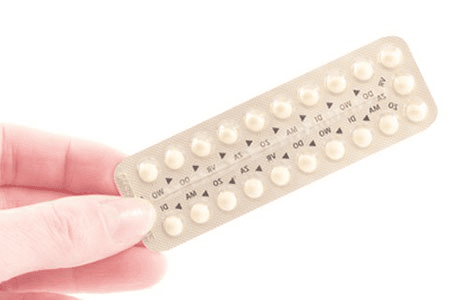This is an automatically translated article.
Apart from rifampin, there is little evidence that antibiotics reduce the effectiveness of oral contraceptives. But there is still an opinion that there is not enough evidence to disprove an interaction between antibiotics and hormonal contraception. To be on the safe side and avoid unwanted pregnancy, it's a good idea to use an extra form of backup birth control while taking antibiotics.
1. Overview
For years, women have been advised that hormonal contraception may become less effective if they take a course of antibiotics at the same time. The usual advice from health care professionals is to add another form of birth control (such as a condom) while taking antibiotics and for 7 days after finishing the course.
Today, most studies claim that antibiotics do not change the effectiveness of oral contraceptives, with the exception of the tuberculosis drug rifampicin (also known as Rifadin and Rimactane). However, experts say many studies are not reliable to draw conclusions. In contrast, a study published in August 2020 found that a combination of birth control and antibiotics may increase the likelihood of an unwanted pregnancy. However, this study still has many limitations.
Because many studies are conflicting, you should discuss this topic with your doctor if you are prescribed antibiotics while using a form of hormonal birth control.
Many women do not accept the increased rate of unwanted pregnancy when taking antibiotics. So your doctor may recommend using another method of birth control (eg, condoms and/or spermicide) to complement the hormonal method during a short course of antibiotics. However, some women do not like to use an additional method of birth control for 1-2 weeks of fertility treatment, or even longer.

Nhiều nghiên cứu cho thấy kết hợp thuốc tránh thai với thuốc kháng sinh có thể làm tăng khả năng mang thai ngoài ý muốn
2. Reports from studies
2.1. Interactions between oral contraceptives and the antibiotic rifampin
According to clinical advice, experts and women's health facilities, only one antibiotic, rifampin (brand names: Rifadin and Rimactane) has been shown to make birth control pills less effective. . In addition, it may be necessary to consider rifabutin with a lower degree of influence. Specifically:
Rifampin reduces the effectiveness of contraception by decreasing levels of birth control hormones (ethinyl estradiol and progestin) in women taking oral contraceptives. Hormone levels needed to prevent ovulation. Rifampin may make enzymes in the liver to break down estrogen more quickly than usual. Decreasing levels of this hormone can make birth control less effective. Rifampin may also decrease the effectiveness of the vaginal contraceptive patch (Ortho Evra) and vaginal ring (NuvaRing). Therefore, you should use a non-hormonal form of birth control. You should use a non-drug method of birth control - for example, a condom, diaphragm or copper IUD with rifampin. Another option is the Depo-Provera birth control shot. A 2018 review published in the American Journal of Obstetrics and Gynecology agrees.
2.2. Interactions between oral contraceptives and other antibiotics
The researchers also found no evidence that interactions between other antibiotics (not rifamycins) and hormonal contraceptives reduce the effectiveness or increase toxicity of either therapy. Specifically:
Two studies found no difference in pregnancy rates among women taking oral contraceptives with/without antibiotics. There was no difference in the suppression of ovulation or breakthrough bleeding when hormonal contraceptives were combined with all antibiotics. There was no significant decrease in the pharmacokinetic parameters of progestin or ethinyl estradiol when used with antibiotics. The authors concluded that most hormonal contraceptives would not be reduced in effectiveness when used with antibiotics (with the exception of rifamycins).
A review from the Journal of the American Academy of Dermatology found that steroid levels of oral contraceptives did not change when a combination of antibiotics was used, including:
Ampicillin Ciprofloxacin Clarithromycin Doxycycline Metronidazole Ofloxacin Roxithromycin Tetracycline

Thuốc kháng sinh (trừ rifamycins) không ảnh hưởng đến hiệu quả tránh thai của các biện pháp tránh thai nội tiết tố
2.3. Critical Research
Despite this, the relationship between antibiotic use and contraceptive failure remains controversial. Some experts say these studies are too small or unreliable to determine interactions when taking emergency contraceptive pills with antibiotics. In addition, there are other studies with conflicting results. Specifically:
Antibiotics can reduce the effectiveness of hormonal contraceptives, including the pill. People who take antibiotics are seven times more likely to have an unwanted pregnancy than other drugs. Unintended pregnancies were also 13 times more common with enzyme-inducing drugs, including some antibiotics. Because of the controversy, experts concluded that women using hormonal contraceptives or taking emergency contraceptive pills with antibiotics should be advised to take additional precautions to avoid pregnancy. unwanted pregnancy. However, the rate of contraceptive failure will vary from woman to woman, depending on her circumstances and psychophysiological characteristics.
2.4. Interactions between birth control pills and other drugs
Besides rifampin or rifamycins, other drugs that induce enzymes can also affect levels of birth control hormones and may decrease the effectiveness of contraception. Therefore, always ask your doctor or pharmacist to evaluate drug interactions when you start and when you stop taking them. Medications to watch out for include prescription drugs, over-the-counter (OTC) drugs, vitamins, and herbs or supplements.
If you are taking these drugs, use condoms as a backup method. Ask your doctor about switching to another non-hormonal method of birth control (for example, a copper IUD or diaphragm) if you have to take interacting medications for a long time.

Thuốc tránh thai có thể xảy ra một số tương tác với nhiều thuốc khác
3. User Advice
It should be remembered that the main reason women get pregnant when using the drug is because they do not take it correctly. According to reports, oral contraceptives have a 1% failure rate when used correctly and 9% when used normally. In other words, with normal use, about 9 out of 100 women can still get pregnant each year while using this drug.
So the key to effective contraception is to take the pill as directed or use reliable birth control. In addition, other conditions, such as vomiting or diarrhea for more than 48 hours, can also decrease the effectiveness of birth control pills.
Please dial HOTLINE for more information or register for an appointment HERE. Download MyVinmec app to make appointments faster and to manage your bookings easily.
References: drugs.com, nhs.uk, healthline.com













